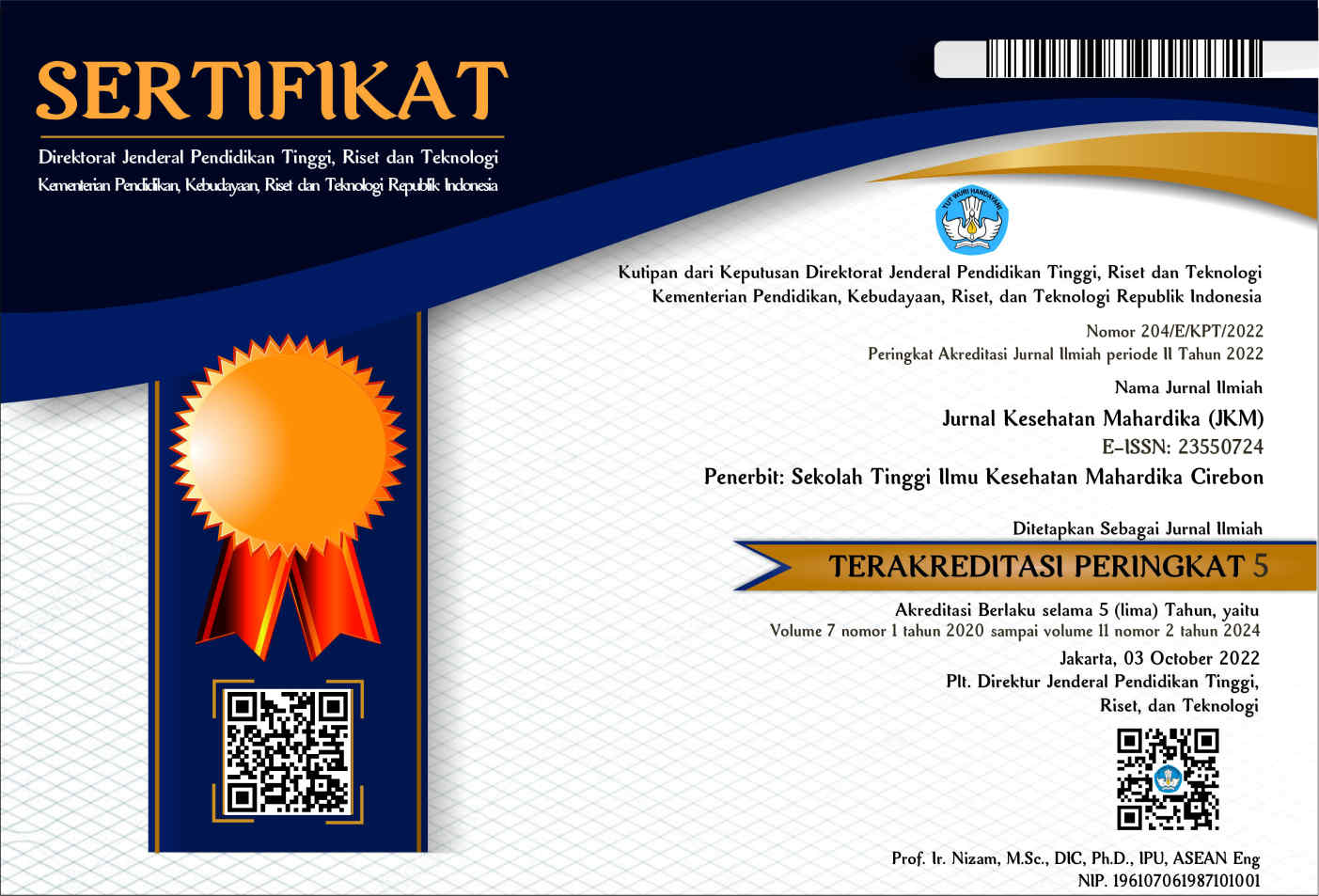Weight Stigma Among Medical Students
Keywords:
weight stigma, obesity, medical studentsAbstract
The prevalence of obesity is increasing throughout the world, including Indonesia. Research on weight stigma is still minimal in Indonesia. The aim of this study is to obtain an overview of weight stigma among medical students. This research uses quantitative methods, the population is 145 and the sample size is 95. The measurement used is the Anti-Fat Attitude Test (AFAT) which has been translated into Indonesian. The result shows that 69.5% of medical students have high weight stigma. The three factors measured are social disparagement, physical/romantic unattractiveness and weight control, generally show high results with percentages that are not much different. However, for female respondents, weight bias tends to be higher 77.7% and the highest factor is weight control. This indicates that female medical students believe that being fat is a personal responsibility and there is no acceptable reason for being fat. In previous research, weight bias had an influence in treating obese patients, included quality of service, patient-doctor relations, psychological well-being and clinical decisions. It is recommended to conduct further research to see the impact of weight bias in health services in Indonesia and the need for education to reduce weight biases
References
World Obesity Federation, World Obesity Atlas, 2023
Kementerian Kesehatan RI, 2019. Laporan Nasional Riskesdas 2018. Balitbang Kesehatan
Jensen et al. 2014. Guideline for the Management of Overweight and Obesity in Adults. Ahajournals. DOI: 10.1161/01.cir.0000437739.71477.ee
Puhl et al. 2009. The stigma of obesity: a review and update. Obesity. 17(5):941-964. https://doi.org/10.1038/oby.2008.636
Wu YK, Berry DC. 2018. Impact of weight stigma on physiological and psychological health outcomes for overweight and obese adults: a systematic review. J Adv Nurs;74(5):1030-1042.
Alimoradi et al. 2019. Weight-related stigma and psychological distress: A systematic review and metaanalysis. Clinical Nutrition, https://doi.org/10.1016/j.clnu.2019.10.016.
Schvey et al. 2014. The Stress of Stigma: Exploring the Effect of Weight Stigma on Cortisol Reactivity. Psychosomatic medicine. DOI: 10.1097/PSY.0000000000000031
Emmer C. et al. 2020. The association between weight stigma and mental health: A meta analysis. Obesity Reviews. doi.org/10.1111/obr.12935
Sutin AR, Stephan Y, Terracciano A. 2015. Weight discrimination and risk of mortality. Psychol Sci;26(11):1803-1811.
Westbury et al. 2023. Obesity Stigma: Causes, Consequences, and Potential Solutions. Current. Obesity Report, 12, 10–23. https://doi.org/10.1007/s13679-023-00495-3
Lawrence et al. 2021.Weight Bias among Health Care Professionals: A Systematic Review and Meta-Analysis. Obesity, 29, 1802–1812.
Permata Y, Kodriati N. 2023. Dampak Stigma terhadap Akses Pelayanan Kesehatan. Higeia Journal Of Public Health Research and Development. https://doi.org/10.15294/higeia/v5i2/39818
Ryan et al. 2023. Weight Stigma Experienced by Patients with Obesity in Healthcare Settings: A Qualitative Evidence Synthesis. Obesity Reviews. 24, e13606.
Hauff C. et al. 2019. Nurse Practitioner Students’ Awareness of Obesity Bias within Clinical Practice. Nurse Pract. June ; 44(6): 41–46. doi:10.1097/01.NPR.0000558157.76596.c7.
Yimaz H, Yabanci A. 2019. Is there prejudice against obese persons among health professionals? A sample of student nurses and registered nurses. Perspectives in Psychiatric Care. DOI: 10.1111/ppc.12359
Phelan et al. 2014. Implicit and Explicit Weight Bias in a National Sample of 4,732 Medical Students: The Medical Student CHANGE Study. Obesity. doi:10.1002/oby.20687
Chae et al. 2024. What are Internal medicine residents' attitudes toward obesity as a disease, people living with obesity, and obesity treatment? Obesity science and practice. https://doi.org/10.1002/osp4.748
Puhl RM, Luedicke J, Grilo CM. Obesity bias in training: attitudes, beliefs, and observations among advanced trainees in professional health disciplines. Obesity. 2014;22(4):1008‐1015. https://doi.org/10.1002/oby.20637
Phelan SM, Puhl RM, Burke SE, et al. 2015. The mixed impact of medical school on medical students’ implicit and explicit weight bias. Med Educ. 49(10):983-992
Phelan et al. 2015. Impact of weight bias and stigma on quality of care and outcomes for patients with obesity. Obesity Reviews. 16, 319–326
Lewis et al. 1997. Prejudice Toward Fat People: The Development and Validation of the Antifat Attitudes Test. Original Articles. Department of Psychology, Old Dominion University, Norfolk, VA.
Spahlholz J, Baer N, König H-H, Riedel-Heller SG, Luck-Sikorski C. 2016. Obesity and discrimination–a systematic review and meta-analysis of observational studies. Obes Rev. 17(1):43-55.
Alberga AS Edache IY, Forhan M, Russell-Mayhew S. 2019. Weight bias and health care utilization: a scoping review. Prim Health Care Res. 20:e116. doi:10.1017/S1463423619000227
Joseph-Williams N, Edwards A, Elwyn G. Power imbalance prevents shared decision making. BMJ. 2014;348:g3178. doi:10.1136/ bmj.g3178
Published
How to Cite
Issue
Section
Copyright (c) 2024 Jurnal Kesehatan Mahardika

This work is licensed under a Creative Commons Attribution-NoDerivatives 4.0 International License.













